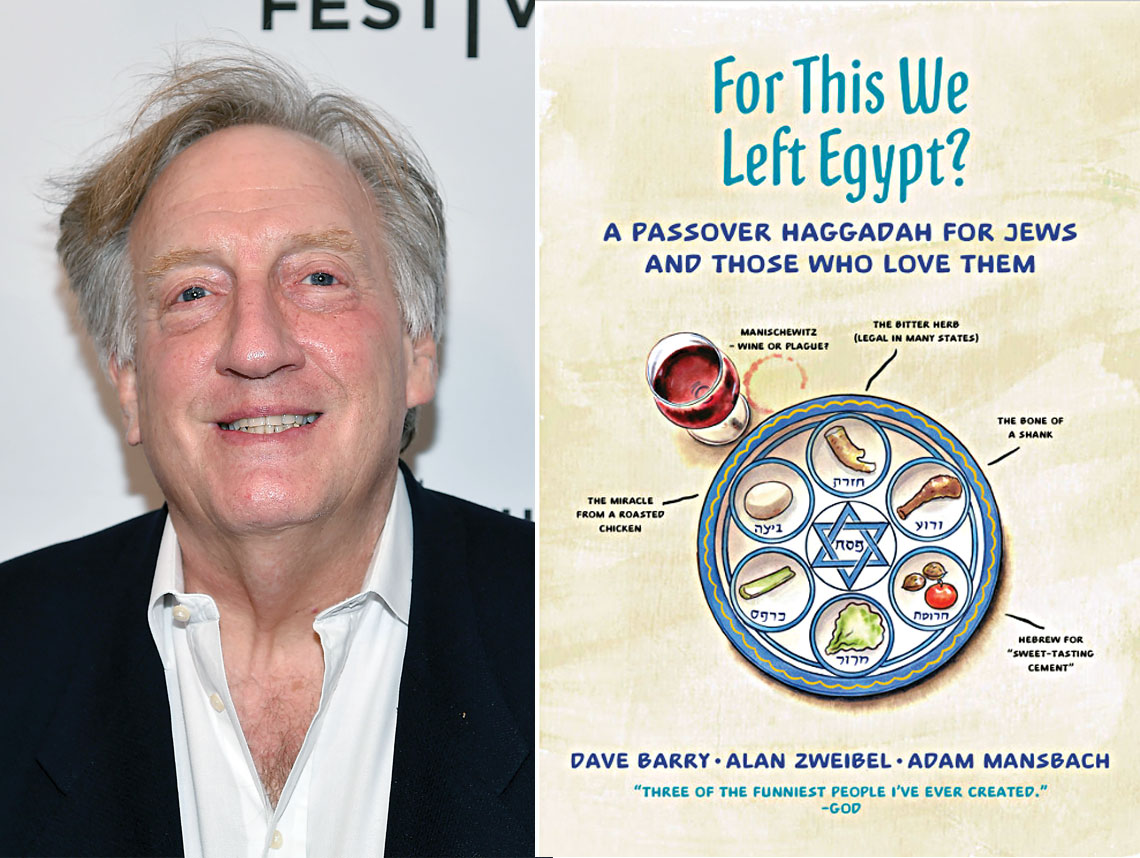 Photo by Ben Gabbe/Getty Images for Tribeca Film Festival
Photo by Ben Gabbe/Getty Images for Tribeca Film Festival For anyone weary of the traditional retelling of the Exodus story during the Passover seder — sometimes filled with as much talk of the suffering Israelites as actual suffering by bored participants — a newly released haggadah written by three legends of laughter aims to inject some comic relief.
“For This We Left Egypt? A Passover Haggadah for Jews and Those Who Love Them,” by Dave Barry, Alan Zweibel and Adam Mansbach, is a humorous answer to Maxwell House’s classic haggadah, filled with irreverent twists on the Passover story, fart jokes and plenty of “Godfather” references.
“[The traditional Exodus story] is a lot of death and plagues. You’re wandering in a desert for what, literally, should take 11 days and it took them 40 years. … You’re incessantly washing your hands during the seder. You’re drinking enough wine or Manischewitz, whatever that is,” Zweibel told the Journal. “We just figured there’s enough there to make fun of and to tell a different version of the story. … It just seemed like it was virgin territory.”
An original “Saturday Night Live” writer with numerous Emmy and Writers Guild of America awards to his name, Zweibel, 66, said he, Barry and Mansbach came up with the idea to write the book in response to their shared frustration with traditional haggadot. Barry, a Pullitzer Prize-winning humor writer, and Mansbach, author of The New York Times best-seller “Go the F— to Sleep,” met through Zweibel, who had worked with each of them on past projects.
Although Barry isn’t Jewish, his wife, Michelle Kaufman, is and he’s quite familiar with Passover traditions, Zweibel said.
“We all felt the same way about seders — they’re interminable. You sit down with every good intention and the kids are there and the grandma and grandpa are there, and it just takes forever until you eat,” Zweibel said. “We knew there were enough people out there, enough Jews out there, who felt similarly. We also felt that, look, for 5,000 years, Jews have been hearing one version of this story. It’s about time they heard ours.”
As expected, the writers’ version dives into silliness right from the get-go. The reader is told the haggadah was named for a former Hebrew slave who drowned when the Red Sea’s walls collapsed on him after he went to retrieve a lost sandal. A list of the Ten Plagues includes Jerry Lewis and “constipation like you would not believe.” We’re told the three prayers uttered while lighting the candles are to commemorate the number of situps Moses did before the slaves escaped (he would have done more, but he was in a hurry).
The hardships of desert life are said to explain the frequent hand washing during the seder.
“After forty years under the scorching desert sun, the Israelites were totally disoriented,” the authors write. “Whenever they asked Moses, ‘Have we washed our hands?’ he invariably replied, ‘I don’t remember. Let’s wash them again, just to be on the safe side.’ ”
It’s the kind of haggadah that might have enlivened Zweibel’s seder meals as a kid. He grew up in a Conservative Jewish household on Long Island, N.Y., and his parents followed the Maxwell House haggadah. He said he always enjoyed the food part of the seder, but it never happened soon enough.
“You look forward to seeing your cousins. You look forward to eating, but you don’t get to eat for a long, long time because the old people there make you say every … word,” he said.
Today, Zweibel, who lives in New Jersey, said he still celebrates the seder annually with his three children, five grandchildren and extended family. He said he’s not sure which haggadah he’ll be using this year, since he will be a guest at another family member’s house.
Despite the book’s irreverence, Zweibel insisted the authors aren’t trying to poke fun at the rituals of the seder, just inject some lighthearted humor.
“We just want people to have a good time,” he said. “Yeah, it’s a different kind of haggadah. Yeah, it’s funny. Yeah, it gives different explanations from the ones you’re used to, there are different discussion questions. … But it’s done with affection, and I think it can be something that’s unifying. That’s the intent here.”




















 More news and opinions than at a Shabbat dinner, right in your inbox.
More news and opinions than at a Shabbat dinner, right in your inbox.